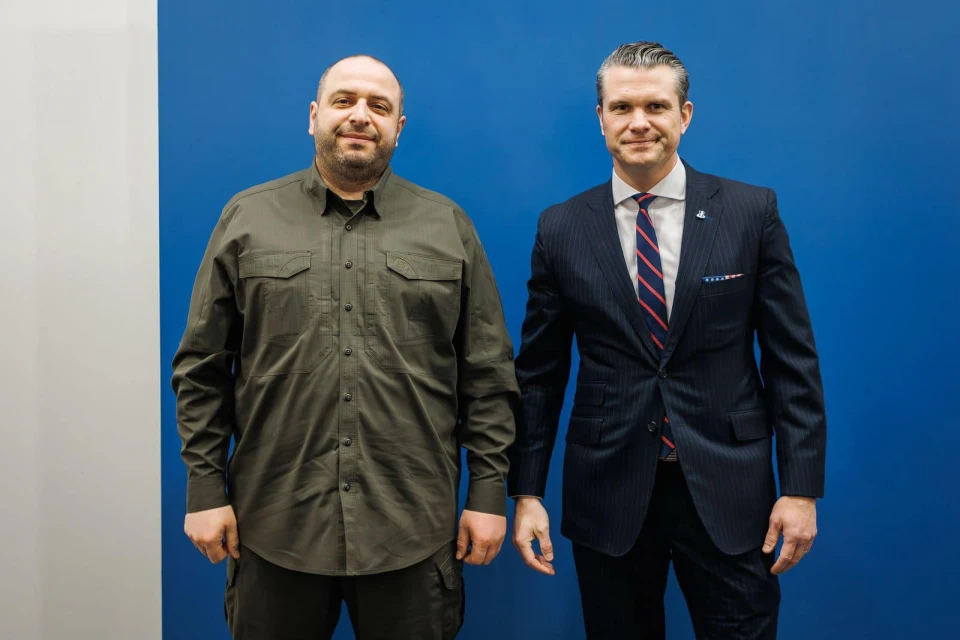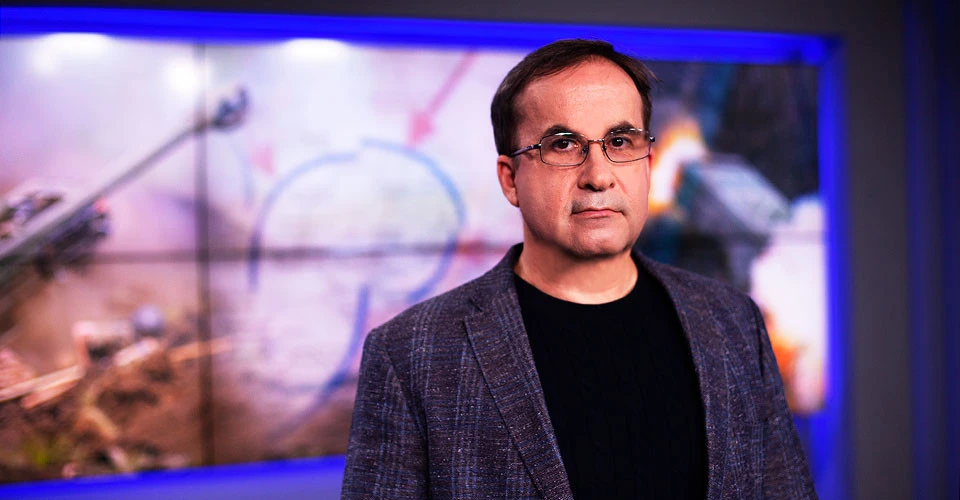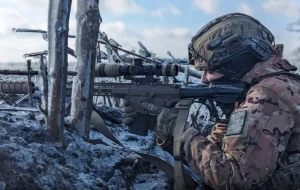
Return to pre-war borders is unrealistic: New Pentagon chief's statements at Ramstein and Ukraine's stance. Serhiy Zgurets' column
On February 12, Russian troops launched ballistic missile attacks on Ukraine. Meanhwile, the 26th Ramstein-format defense meeting began in Brussels
Attack on Ukraine with drones and ballistics
Yesterday, Russia launched another missile and drone attack on the Ukrainian capital and other cities. The attack included seven Iskander-M ballistic missiles, as well as 123 drones of various types. Six of the Iskanders were fired from the Bryansk region, while one was launched from the temporarily occupied Crimea.
As a result of the strike on the capital, one person was killed and four others were injured. It can be confirmed that the Patriot systems were primarily used to intercept the ballistic attack on the capital.
The systems are capable of intercepting ballistic missiles at various altitudes, but even when a missile is directly hit, there have been instances where the missile is diverted yet still detonates its warhead. A large crater at one impact site suggests that the missile was redirected, but it still exploded upon impact.
In any case, this situation has set the stage for the meeting of defense ministers in Ramstein. It clearly highlights the ongoing need to increase the number of air defense systems being transferred to Ukraine. Not all the systems that were promised have been delivered yet. Specifically, the transfer of Patriot systems from the United States, which had been announced earlier, has also faced delays.
Ramstein
In general, regarding the meeting in Brussels in the Ramstein format, it was the first such meeting chaired by the British Defense Secretary. Defense Secretary John Healey emphasized that the main goal was to intensify support for Ukraine.
The UK, as we know, has security support agreements with Ukraine. Healey stated that the UK will provide assistance amounting to 3 billion pounds annually. Part of this includes an additional package of 152 million pounds, which will cover the supply of specific weapons to the Ukrainian Armed Forces.
Ukraine's Defense Minister Umerov, when discussing Ramstein and the objectives of the event, emphasized that the focus was on ensuring a stable and timely supply of military aid for 2025. The conversation centered on accelerating the delivery of critical weapons, particularly air defense systems, aircraft systems or weapons for aircraft, and artillery ammunition. Additionally, they discussed investments in Ukraine's defense industry and joint projects with European partners.

Umerov also met with the U.S. Secretary of Defense, the new head of the Pentagon, Pete Hegseth. While a photo of the meeting was shared, it remains unclear whether it was a bilateral conversation, and no further details were provided. Interestingly, prior to the Ramstein meeting, it was suggested that the new U.S. Secretary of Defense would attend the event as a listener, not announce any military aid packages, or hold face-to-face meetings with Ukrainian counterparts. However, in practice, it turned out that Pete Hegseth made several statements that reflected the current policy of the new U.S. administration regarding Ukraine and the resolution of the Russian-Ukrainian war.
First and foremost, Hegseth stated that the U.S. president aims to end the war in Ukraine through diplomatic means. However, he also emphasized that a return to the 2014 borders seems unrealistic. According to the U.S. Secretary of Defense, a lasting peace in Ukraine must be built on strong security guarantees to ensure that the war does not reignite.
"This must not be Minsk 3.0," Hegseth stated, adding that the United States does not view Ukraine's NATO membership as a realistic goal. He emphasized that security guarantees should be supported primarily by capable European and non-European troops. However, he clarified that American troops will not be deployed in Ukraine as part of these security guarantees.
The U.S. Secretary of Defense also mentioned that, moving forward, Europe should take on the responsibility of providing the majority of Ukraine's lethal and non-lethal aid.
There have been various formats discussed in the media, including Europe purchasing weapons for Ukraine from the United States. In return, Ukraine would provide certain guarantees of return on investment, potentially in the form of natural resources. These are some of the new nuances that emerged on the first day of the Ramstein meeting.
While more details are expected at the Munich conference, there's still a period of uncertainty about how the United States will act to swiftly resolve the war between Russia and Ukraine. This is an issue that, in part, requires a proactive stance from Ukraine itself.
Mykhailo Samus, a military expert and director of the New Geopolitics Research Network, as well as the deputy director of the Center for Army, Conversion, and Disarmament Studies, commented on the statements made by the new U.S. Secretary of Defense. He shared his thoughts on whether these new emphases should be considered and whether Pete Hegseth's words reflect an effort by the U.S. to shape its approach to resolving the Russian-Ukrainian war.
"The articulation is quite clear. Until the last moment, there were assumptions or illusions that some options could actually be considered regarding our constitutional territories. As we say: 'We do not discuss territories. We don't discuss the status of the territory, we can only agree to a ceasefire or the cessation or freezing of hostilities.' And here, the U.S. Secretary of Defense is stating what the United States believes," Mykhailo Samus explained.
He emphasized that the U.S. Secretary of Defense is presenting a perspective — these are not definitive facts in objective reality, but rather the subjective opinion of the U.S. Secretary of Defense.
"This opinion reflects the current position of the United States, but it doesn't represent the entire world or the full scope of objective reality. So, we shouldn't jump to conclusions just because the U.S. says so. They believe that we must now accept the return to our constitutional territories, as some argue over the borders of 1991 or 2014. In fact, there’s no such thing as '91 borders or any other year; what matters is the Constitution of Ukraine, which defines the boundaries of Ukraine’s sovereign territory, and that territory must remain intact. The U.S. position clearly indicates that we are discussing a territory defined by the actual situation on the ground. As Putin has also mentioned, he was prepared to consider the situation as it stands, but he also added that he still had demands concerning the Russian constitution, which already includes the Ukrainian regions that are not under occupation," the expert recalled.
He emphasized that these statements from the U.S. Secretary of Defense are crucial in ensuring there are no illusions about the U.S. stance – they believe the situation on the ground is now settled, and there's no point in discussing the return of the territories.
"Now, it’s important to understand our position. Do we agree with the United States’ stance? What are their reasons? The U.S. now needs to justify its position. They claim, 'This is unrealistic now.' Why is it unrealistic? Is it because they want to end the war more quickly at the expense of Ukrainian interests? Or is it because they’re unwilling to provide us with more aid? Or do they already have some kind of agreement with Putin?" he questioned.
Mykhailo Samus noted that on February 11, it was reported that a plane, allegedly belonging to U.S. Special Envoy for the Middle East Steve Witkoff, had arrived in Moscow.
“I’ll remind you that yesterday there was an interesting development when another U.S. representative, the official Middle East envoy, Steve Witkoff, who is a close friend of Trump’s in both golf and business, flew to Moscow and picked up an American citizen. For me, this indicates that Trump has already fallen into the KGB's trap, Putin's trap. Putin thrives on this kind of thing—taking an American or Ukrainian citizen as a hostage and then bargaining with them. And, unfortunately, Trump has already bitten the hook. I’m sure Putin will offer more hooks. It's also notable that while throwing the hook to Trump, Putin simultaneously struck Kyiv with ballistic missiles,” the military expert said.
He emphasized that these are signals to Ukraine, Europe, and Donald Trump: "Look, we are in control of the situation. Unfortunately, it’s still clear to me that Trump is making statements, but Putin has the initiative, and he’s taken it by extraditing this hostage. And this is very bad."
Ukraine's position
The question arises as to what Ukraine's position should be. Just this week, the next issue of Reflections, an analytical product produced by the Defense Information Consortium, was published, where the first article of this analytical study was devoted to possible variations of the creation of a European security system with the strategic support of the United States. The question arises: what is the importance of this area of discussion and the creation of such a security system, how realistic is it, what are the main components, and what are the possibilities for its implementation.
“In fact, this trend — this idea that Europe needs to mature and recognize that Ukraine is also part of Europe — when I say Europe, I mean Ukraine, of course. Europe must understand that we cannot outline our own actions or position in the future if we remain dependent on the United States. Right now, the United States is not a reliable partner. While it is, in some respects, an important and strategic partner, the way the United States operates now is not aligned with the norms of international law or relations that we are accustomed to. Even when we discuss the security system, which since 1945, after the Second World War, has been shaped by U.S. influence over Europe’s security, I believe, and the Consortium for Defense Information agrees, that it is time to build our own European security system that can autonomously defend against Russia,” Samus stated.
It will also be able to counter threats from other countries: China, Iran. This should also be a strategic direction, for example, the creation of nuclear forces, the creation of missile defense forces, long-range missile forces, the creation of European defense forces with combined arms components, air forces, etc. But this is a long-term process, the expert noted.
“And it is important for Ukraine to maintain, of course, a strategic partnership with the United States. In any case, in the short and medium term, in the long run. This is extremely important, because Europe, unfortunately, is not yet ready to take on this responsibility: to fully ensure the security and defense of our continent against threats from Russia. I would also like to draw attention to the fact that when we talk about the threats of the current period, it is important for Ukraine to really understand what our position is in relations with the Trump administration. Whether to continue to agree with everything that Trump says, the Secretary of Defense or others say,” he said.
According to Mykhailo Samus, Ukraine has been using the right tactics so far.
“So we agree. Do you want a freeze? Ukraine agrees. You want to offer us projects on rare earth metals? Okay, that's a good idea. Do you want to offer a landline to Ukraine? Great, let's try it, but when the United States says something about Ukrainian territories, we need to demonstrate that no one can talk about Ukrainian territories. Neither Russia nor the United States. The United States cannot tell us how to act with regard to our territories. That is, Ukraine must now demonstrate that what the United States says to us does not mean dictation. A sole dictate, where Ukraine agrees with everything,” he emphasized.
The military expert suggested what Ukraine's rhetoric could be like when it comes to discussing territories.
“We should probably make it clear: 'You think it’s unrealistic, and we think it’s truly unrealistic, especially given that we lack the key elements of warfare, such as tools for conquest, air dominance, or long-range missiles like the ATACMS, and the deterrent forces necessary to prevent Russia from waging war against Ukraine. In line with the Budapest Memorandum, we can bring that up again. We believe that Ukrainian territory should not be up for discussion at all. We can discuss various aspects like rare earth metals, lend-lease, aid, and partnership, and we agree with transferring security functions to Europe. But Ukrainian territory is not negotiable. Ukraine will decide its own future. We do not accept the notion that Ukrainian territory is defined by pre-2014 or post-2014 lines. We have a constitutional territory, and we will strive to return it all under our control. This means the end of Russia's occupation of Ukrainian land,’” Samus stated.
In his opinion, this should be officially declared. Otherwise, there is a risk of overstepping, which could lead to problems within the settlement process and, according to the expert, exacerbate the internal situation in Ukraine.
This is absolutely correct, because now a certain negotiation track is starting to form between the Russian Federation and the United States, bypassing Ukraine and even Europe. The situation is far from normal.
“If the United States, Trump, or the U.S. Secretary of Defense says that Europe bears the primary responsibility for providing security and security guarantees, they are, in fact, talking about deterring Russia in the war against Ukraine. But fundamentally, they are against the war and against Europe. So, a logical question arises: if Europe is responsible and will bear the main responsibility, then of course Europe should be involved in the negotiations. Europe has its own position. Yet, it turns out that the United States and Russia will decide what role Europe will play. Well, I’m sorry, but this is a completely wrong approach. Europe should determine its own role based on its own interests—just like Ukraine. And so, indeed, this is a critically important period,” said the director of the New Geopolitics Research Network.
He also noted that, in his opinion, Trump’s special representatives, Keith Kellogg and Steve Witkoff, will divide the countries they engage with.
“Regarding the track that the United States is currently building with Russia, I have the impression that Keith Kellogg will be in charge of Ukraine and Europe, while Mr. Witkoff, who is a personal friend of Trump, will be responsible for Russia. In other words, Keith Kellogg will formulate a position based on what he hears in Europe and Ukraine, while Mr. Witkoff will present proposals to Trump based on what he is told in Moscow—or rather, what he has been told in Moscow. I understand that this communication will continue. It is Witkoff who will advise Trump on how to approach Putin,” said Mykhailo Samus, military expert, director of the New Geopolitics Research Network, and deputy director of the Center for Army, Conversion, and Disarmament Studies.
In any case, we can expect new statements from various officials. We'll see how the Munich Security Conference unfolds and what statements will be made by the American side. This should allow, I hope, official Kyiv to adopt a tougher and more active position, one that will influence our partners, despite the strategic nature of the relationship and the challenges surrounding American assistance and its conditions.
- News













































